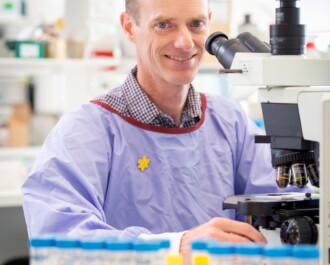
New biomarkers, or what is being referred to as a new ‘epigenetic signature,’ has been identified by a team of researchers that included NBCF-funded researchers, Associate Professor Clare Stirzaker and Professor Sandra O’Toole – for one of the rarest and what can be a difficult-to-diagnose breast cancers, phyllodes tumours.
This discovery could make diagnosis and classification easier and lead to more effective decision making about the care and treatment options for people with this rare cancer type.
Phyllodes tumours account for just 1% of breast tumours and because of their lower prevalence, our understanding is limited. Most Phyllodes tumours are benign, but about 10% are classified as malignant.
Diagnosis currently relies on analysing a person’s tumour cells under the microscope. However, accurate diagnosis and classification can be difficult, since phyllodes tumours share features and can have a similar appearance to other cancers, and breast cancer types.
Thus, better methods for accurate diagnosis and classification of phyllodes tumours is a key step towards improved outcomes for people so they can make more informed decisions about their care and receive the most appropriate and timely treatments.
DNA methylation is a marker, or modification that occurs on the DNA that can change the expression of some genes. This occurs in healthy cells, but the modifications are altered in cancer. In other cancer types, changes to the pattern of DNA methylation or ‘epigenetics’ have been used to help diagnose and guide treatment.
The research was carried by a team that included NBCF-funded Professor Sandra O’Toole and Associate Professor Clare Stirzaker from the Garvan Institute of Medical Research, together with members of their team, Dr Braydon Meyer, Dr Ruth Pidsley and Professor Susan Clark.
The team investigated the DNA patterns in phyllodes tumours. Professor O’Toole explained, “DNA methylation could provide novel biomarkers for diagnosis and classification of phyllodes tumours, whilst also providing insight into the molecular cause of this otherwise understudied tumour”.
The study characterised the epigenetic patterns in 33 tumour samples from people who had tumours removed between 2007 and 2017 and were part of The Phyllodes (Australian) cohort. Findings from this research revealed a unique DNA methylation pattern specific to phyllodes tumours when compared to similar tumours. The researchers were also able to show that the DNA methylation was different in malignant compared with benign tumours, a finding that could help to classify more accurately these difficult-to-diagnose tumours.
In Australia, women who are diagnosed with early stage (stage I) breast cancers have an extremely good outcome and a five-year relative survival rate of 100%. Researchers are now working to develop a sensitive and accurate epigenetic-based test to make diagnosis and classification of phyllodes tumours easier and faster since delayed or inappropriate treatment can be detrimental to a person’s outcome.
The research we fund is critical to driving this improvement in breast cancer outcomes and each study helps bring us closer to achieving our vision of Zero Deaths from breast cancer.
The findings of this study were published in the Journal of Pathology.
More News Articles
View all News


